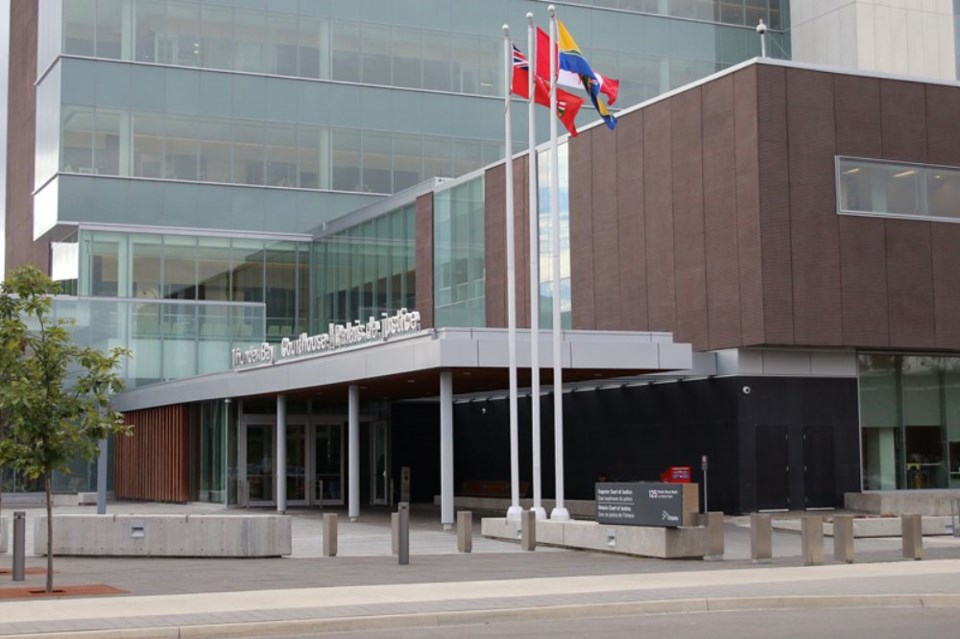THUNDER BAY – David Wilson is a “dangerous psychiatric patient” responsible for the action of fatally stabbing Robert Barbeau but he is not responsible for the crime, his defence lawyer told the jury during closing arguments.
Both defence lawyer Neil McCartney and Crown prosecutor Rob Kozak had their final opportunity to address the 12-member jury on Monday before deliberations in the second-degree murder trial begin later this week.
They both agree Wilson stabbed the 48-year-old Barbeau on the evening of June 5, 2014 in the parking lot of their McLaughlin Street apartment complex, leaving a hunting knife lodged in the victim’s head.
The question for the jury is whether the now 50-year-old Wilson, who was diagnosed with schizophrenia nearly three decades ago, is criminally responsible for the killing.
McCartney urged the jury to find Wilson not criminally responsible, pointing to a report from forensic psychiatrist Dr. Robert Sheppard who said he believed Wilson lacked the capacity to apply the knowledge his actions were wrong.
During his address, McCartney told the court a not criminally responsible verdict will not release Wilson into the public and they won’t find him beside them at a movie theatre the next night.
Instead, Wilson would remain an inmate in a secure forensic psychiatric unit until it is determined he does not possess a threat to the public, which could mean he remains hospitalized for the rest of his life.
In most cases, the burden of proof lies on the Crown to prove beyond a reasonable doubt the accused is guilty of the crime. In not criminally responsible matters, it is the obligation of the defence to prove the accused either lacked the ability to recognize the physical consequences of their actions or the wrongfulness of their conduct.
McCartney challenged the Crown’s case, asserting the prosecution was “flying blind” by not calling witnesses such as Wilson’s nephew who was assaulted 11 days before the attack and the neighbour who Wilson approached with homicidal urges just two days prior to killing Barbeau.
The unprovoked, “out of the blue,” attack on his nephew had many similarities to the fatal stabbing of Barbeau less than two weeks later, providing a glimpse to the severity of the psychotic symptoms.
The defence lawyer also questioned many elements of the report from a second forensic psychiatrist, Dr. Mark Pearce, saying his findings “lacked focus” and did not thoroughly examine all elements of the assessment.
“Just because an expert has an impressive medical resume doesn’t mean they have a monopoly on judgement,” McCartney said.
He instead praised the report from Sheppard, who believed Wilson was under mounting pressure to participate in violent and homicidal activity which led to his mental state being overcome with delusions and lost the ability to have rational thought and make rational choices.
During his following address, Kozak took issue with the notion that Wilson had lost the ability to control his actions.
Kozak frequently referred to the assessment from Pearce, who concluded despite the mental illness, Wilson’s actions were likely motivated by rage and anger over previous conflicts with the victim.
“Mentally ill people committing crimes on that basis should not be absolved of responsibility,” Kozak said.
In the minutes prior to the stabbing, Wilson had asked Barbeau to supply him with painkillers to help his ailing back during an upcoming long bus ride to Toronto.
The refusal to provide painkillers became the “straw that broke the camel’s back” in their strained relationship that previously included frustration with personal items left in the hallway, a physical confrontation over stolen scrap metal, a dispute over a shelving unit and Wilson’s embarrassment about being observed engaged in sexual conduct with an inflatable sex object, Kozak argued.
Wilson self-reported to psychiatrists that he said, “What do you got to say for yourself now” after driving the knife through Barbeau’s temple and standing over his body.
That, combined with acknowledging his “goose was cooked” when confronted about making a remark to police officers within 24 hours of being arrested of targeting the insanity plea, are significant comments of concern.
Kozak argued Pearce’s report was thorough and contained many examples of quotations from Wilson that identify his motivations for the stabbing, including feelings of rage and embarrassment, and had expressed a desire to kill Barbeau in the days leading up to the actual attack.
The jury is expected to receive their charge and begin deliberations on Wednesday.
